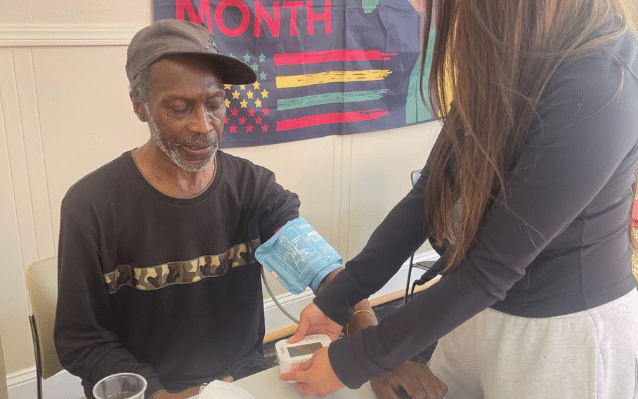Every Tuesday for ten weeks, the lobby of the Senator Hotel becomes something more than just a common space—it becomes a wellness hub. Through a long-running partnership with the nursing program at San Francisco State University (SFSU), HomeRise hosts groups of student nurses who provide essential health services and a healthy dose of human connection to our residents.
What began as a simple initiative to offer blood pressure screenings has evolved into a dynamic program supporting nutrition education, chronic disease prevention, and social connection. Now in its fourth year, the program runs twice annually and has become a cornerstone of holistic care for HomeRise residents.
From Screenings to Smoothies—Meeting Resident Needs
The student nurses begin each session with a Welcome Brunch, allowing residents to meet the new team and learn what to expect. From there, the interns offer weekly services that go far beyond routine check-ups.
For many residents, blood pressure checks are their first step toward engaging with the healthcare system. Some discover dangerously high readings for the first time and, with the nurses’ support, get immediate referrals for medical intervention—averting strokes or other serious complications. Nurses also help residents enroll in health plans and set up appointments with primary care providers, reducing reliance on emergency rooms for non-urgent care.
For JB Butler, a longtime resident at the Senator, these weekly visits with student nurses Allen and Ali became a lifeline. Like many underserved individuals, JB had long struggled to navigate the healthcare system and manage multiple chronic conditions. Each Tuesday, he would stop by to check his blood pressure—once critically elevated—now within a healthy range thanks to consistent monitoring and support. The nurses also offered guidance on managing his diabetes through diet, making it easier to take small, sustainable steps toward better health.
One week, JB mentioned pain and swelling in his finger. Allen and Ali took his concern seriously and helped schedule a medical appointment. The surprising diagnosis? A small stone lodged in his knuckle, requiring surgery. Without the nurses’ intervention, JB might have continued to suffer needlessly. Instead, he received care and resolution. “The nurses always help me with appointments and understanding the procedures that I need,” he shared. “I trust them, and they are always welcoming and happy to see me. For me, these are important conversations that I need to have as I age and the changes that my body is going through.”
Stories like JB’s also leave a lasting impression on the student nurses. As Allen reflected, “Working at the Senator can be very challenging, but it is some of the most fulfilling work I have done.”
As the program has grown, nutrition education has taken center stage. With the help of donated ingredients from local farmers markets and food rescue partners like ExtraFood, nurses lead interactive sessions where residents prepare meals and smoothies while learning about heart-healthy, diabetes-friendly eating. These shared activities have led to open discussions around chronic health issues, better shopping habits, and practical meal planning strategies residents can carry forward.
Each cohort adapts its services to meet the specific needs of the residents at their assigned site. Some groups have introduced new resource binders with updated information on local services. Others have offered informal sessions on topics like end-of-life planning or navigating mental health care. A standout initiative has even included baking and decorating healthy cupcakes together—a creative way to support nutrition while building community.
A Model for Connection, Care, and Replication
In addition to providing essential health education, the program has become a valuable tool in reducing social isolation—particularly among seniors and new residents. Isolation can significantly impact both physical and mental health, increasing the risk of conditions such as hypertension, cognitive decline, and depression. The weekly nurse-led sessions give residents something to look forward to: conversation, laughter, and the joy of sharing stories and meals together.
Reminiscing has emerged as a spontaneous and recurring theme during group activities. Residents frequently share memories from their past, discovering new connections and common ground with others who live in the building. These small moments of recognition and friendship help residents feel more at home in their communities and more empowered in their wellness journeys.
The program ends with a Goodbye Brunch, offering a chance for reflection and gratitude. While each group of student nurses is different, they leave behind healthier residents, updated wellness resources, and a community better equipped to care for itself.
Thanks to its flexible and responsive design, the SFSU nursing partnership is already being replicated across multiple HomeRise sites, including Cambridge Apartments and 666 Ellis, in addition to the Senator Hotel. With each semester, the program strengthens—not only supporting residents but also shaping the next generation of public health professionals. Many nursing students finish their internships inspired to pursue careers in community health, a reflection of the powerful impact this work has on their professional outlook.
As HomeRise continues to grow and welcome new leadership, expanding this model to more sites remains a top priority. The goal is to ensure all residents have access to the same level of care, education, and connection—no matter which building they call home.

